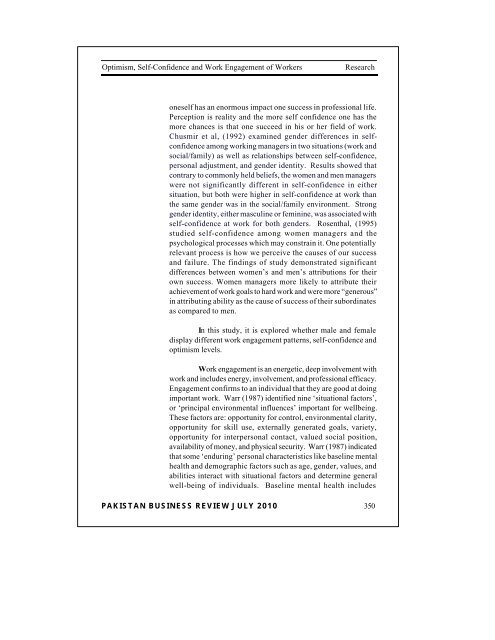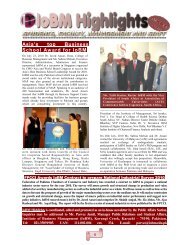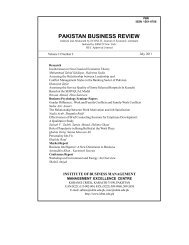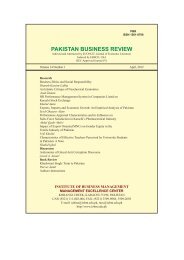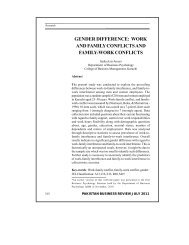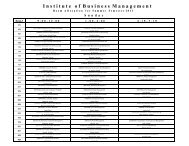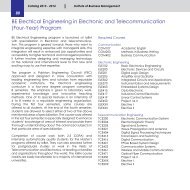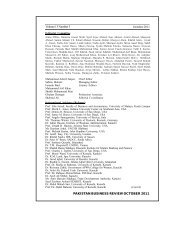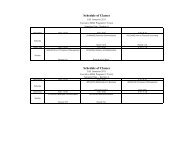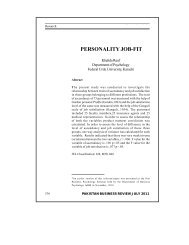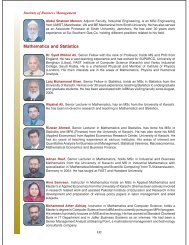Complete Volume - Institute of Business Management
Complete Volume - Institute of Business Management
Complete Volume - Institute of Business Management
You also want an ePaper? Increase the reach of your titles
YUMPU automatically turns print PDFs into web optimized ePapers that Google loves.
Optimism, Self-Confidence and Work Engagement <strong>of</strong> Workers<br />
Research<br />
oneself has an enormous impact one success in pr<strong>of</strong>essional life.<br />
Perception is reality and the more self confidence one has the<br />
more chances is that one succeed in his or her field <strong>of</strong> work.<br />
Chusmir et al, (1992) examined gender differences in selfconfidence<br />
among working managers in two situations (work and<br />
social/family) as well as relationships between self-confidence,<br />
personal adjustment, and gender identity. Results showed that<br />
contrary to commonly held beliefs, the women and men managers<br />
were not significantly different in self-confidence in either<br />
situation, but both were higher in self-confidence at work than<br />
the same gender was in the social/family environment. Strong<br />
gender identity, either masculine or feminine, was associated with<br />
self-confidence at work for both genders. Rosenthal, (1995)<br />
studied self-confidence among women managers and the<br />
psychological processes which may constrain it. One potentially<br />
relevant process is how we perceive the causes <strong>of</strong> our success<br />
and failure. The findings <strong>of</strong> study demonstrated significant<br />
differences between women’s and men’s attributions for their<br />
own success. Women managers more likely to attribute their<br />
achievement <strong>of</strong> work goals to hard work and were more “generous”<br />
in attributing ability as the cause <strong>of</strong> success <strong>of</strong> their subordinates<br />
as compared to men.<br />
In this study, it is explored whether male and female<br />
display different work engagement patterns, self-confidence and<br />
optimism levels.<br />
Work engagement is an energetic, deep involvement with<br />
work and includes energy, involvement, and pr<strong>of</strong>essional efficacy.<br />
Engagement confirms to an individual that they are good at doing<br />
important work. Warr (1987) identified nine ‘situational factors’,<br />
or ‘principal environmental influences’ important for wellbeing.<br />
These factors are: opportunity for control, environmental clarity,<br />
opportunity for skill use, externally generated goals, variety,<br />
opportunity for interpersonal contact, valued social position,<br />
availability <strong>of</strong> money, and physical security. Warr (1987) indicated<br />
that some ‘enduring’ personal characteristics like baseline mental<br />
health and demographic factors such as age, gender, values, and<br />
abilities interact with situational factors and determine general<br />
well-being <strong>of</strong> individuals. Baseline mental health includes<br />
PAKISTAN BUSINESS REVIEW JULY 2010<br />
350


